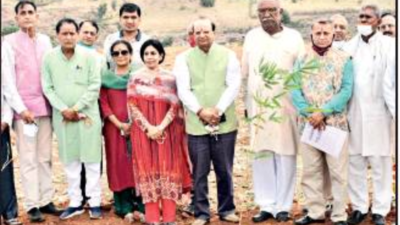- News
- City News
- jaipur News
- Khadi commission plants 5,000 bamboo saplings to help tribal economy in Udaipur
Khadi commission plants 5,000 bamboo saplings to help tribal economy in Udaipur

Members of khadi commission during the plantation drive in Udaipur on Sunday
JAIPUR: In a bid to reduce desertification, provide livelihood opportunities in tribal areas and support rural industry, Khadi and Village Industries Commission (KVIC) planted 5,000 bamboo saplings in tribal village Nichla Mandwa in Udaipur on Sunday.
Kicking off the project ‘Bamboo Oasis on Lands in Drought’ (BOLD) in the presence of local MP Arjun Lal Meena and over 2,000 villagers, Vinai Kumar Saxena, chairman of KVIC said they will replicate the initiative in Gujarat and Leh-Ladakh August this year, planting 5,000 saplings at each location before August 21.
Saxena said the green patches will help in reducing land degradation, while on the other hand they will be havens of sustainable development and food security.
“Bamboo plantation drive on such a large scale will create additional income for the local tribal population while supporting the local bamboo-based industries and boosting the rural economy. In three years, these bamboo patches will be able to meet the requirement of agarbatti manufacturers in Rajasthan, Gujarat and Madhya Pradesh.”
Additionally, Saxena said, the bamboo patches will contribute to the larger UN’s sustainable development goals (SDGs) of reducing land degradation and preventing desertification in the country.
“KVIC created a world record of planting the highest number of bamboo saplings on a single day at one location on Sunday,” added Saxena.
Bamboos grow fast and in about three years’ time, they could be harvested, generating income for the tribal populace. “The 5,000 bamboo plants will produce at least 20,000 bamboo logs weighing about 500 tonnes. At the current market rate of Rs 5,000 per tonne, the produce will generate an income of nearly Rs 25 lakh after three years and later on every year, which will support the local economy,” added Saxena.
Meena said the bamboo plantation programme in Udaipur will boost self-employment among a large number of women and unemployed youths in the region. We will also connect them to skill development programmes where bamboos are used for various products.
Bamboo can be used for making agarbatti sticks, furniture, handicraft, musical instruments and paper pulp while the waste can be used in making charcoal and fuel briquette.
Bamboos are also known for conserving water and reducing evaporation of water from the land surface, which is an important feature in arid and drought-prone regions.
Kicking off the project ‘Bamboo Oasis on Lands in Drought’ (BOLD) in the presence of local MP Arjun Lal Meena and over 2,000 villagers, Vinai Kumar Saxena, chairman of KVIC said they will replicate the initiative in Gujarat and Leh-Ladakh August this year, planting 5,000 saplings at each location before August 21.
Saxena said the green patches will help in reducing land degradation, while on the other hand they will be havens of sustainable development and food security.
“Bamboo plantation drive on such a large scale will create additional income for the local tribal population while supporting the local bamboo-based industries and boosting the rural economy. In three years, these bamboo patches will be able to meet the requirement of agarbatti manufacturers in Rajasthan, Gujarat and Madhya Pradesh.”
Additionally, Saxena said, the bamboo patches will contribute to the larger UN’s sustainable development goals (SDGs) of reducing land degradation and preventing desertification in the country.
“KVIC created a world record of planting the highest number of bamboo saplings on a single day at one location on Sunday,” added Saxena.
Bamboos grow fast and in about three years’ time, they could be harvested, generating income for the tribal populace. “The 5,000 bamboo plants will produce at least 20,000 bamboo logs weighing about 500 tonnes. At the current market rate of Rs 5,000 per tonne, the produce will generate an income of nearly Rs 25 lakh after three years and later on every year, which will support the local economy,” added Saxena.
Meena said the bamboo plantation programme in Udaipur will boost self-employment among a large number of women and unemployed youths in the region. We will also connect them to skill development programmes where bamboos are used for various products.
Bamboo can be used for making agarbatti sticks, furniture, handicraft, musical instruments and paper pulp while the waste can be used in making charcoal and fuel briquette.
Bamboos are also known for conserving water and reducing evaporation of water from the land surface, which is an important feature in arid and drought-prone regions.
FacebookTwitterLinkedinEMail
Start a Conversation
end of article
Quick Links
Delhi Air PollutionDelhi TemperatureChennai WeatherBangalore TemperatureCovid vaccination centres in DelhiCoronavirus in DelhiRTPCR test in GurgaonHyderabad RainPollution level in BangaloreDelhi SmogDelhi TemperatureNoida AQIGurgaon AQI todayFire in MumbaiMumbai RainsCovid 19 RT PCR Test in NoidaDelhi AQI todaySrinagar encounter
